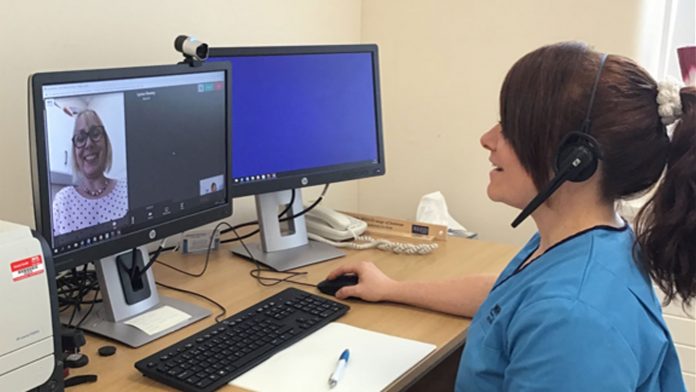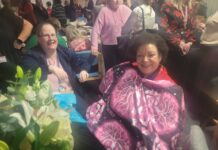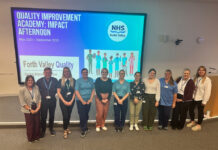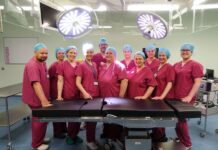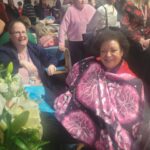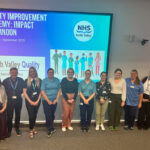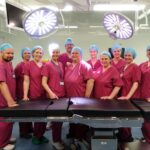Thousands of patients across Forth Valley have been able to continue to access expert health information and advice during the Covid-19 pandemic thanks to a huge rise in the use of video consultations. The Near Me service has been used by a wide range of staff across the organisation to keep in touch with their patients and enabled more than 6,000 scheduled appointments to go ahead as planned.
The video technology is being used by a diverse range of services including mental health, maternity, physiotherapy, speech and language therapy and respiratory services. It has also been widely used by local GPs across the Health Board area to provide advice to patients in their own homes. One service which has embraced the use of Near Me is NHS Forth Valley’s Orthotics Service which has seen a tenfold increase in the use of online appointments since the start of the Covid-19 pandemic. More than 40 people a month are now opting for virtual appointments with the service, a figure set to rise as lockdown restrictions are eased.
NHS Forth Valley Team Lead for Orthotics, Lynne Rowley, said: “We’ve been amazed at how many people are happy to use this technology including a lot of older patients who have really embraced this way of communicating. I suspect many of them are in social isolation because of lockdown and family members have been advising Mum and Dad on how to use smartphones, laptops and tablets which has also helped.”
NHS Forth Valley’s Orthotics Service is provided by four orthotists. Before the Covid-10 pandemic outpatient clinics were held 5 days a week. There were also joint multidisciplinary team clinics with podiatry and physiotherapy colleagues consulting in spasticity and wound care clinics. In addition, orthotists visited wards, care homes, schools and people’s homes to deliver care via face-to-face appointments.
When routine outpatient appointments were postponed to help free up capacity and try to reduce the spread of the virus, the Orthotics team set up a telephone helpline, created online resources to provide advice and initially contacted 30 patients offering virtual appointments. Twenty agreed, the others preferring to wait until they could attend hospital for a face-to-face consultation. But as Lynne Rowley explained, the video consultations did at first throw up the need for a spot of improvisation: “One patient had no access to a flexible measuring tape, so a piece of string was measured and used as an alternative. Using a fixed camera can also sometimes prove challenging as when a patient is using a laptop on a desk it can be difficult to view their foot or leg. This has resulted in some interesting yoga positions having to be adopted at times! However people are very resourceful and we have found solutions to every situation we have encountered so far.”
The team say the virtual clinics are an efficient way of supporting patients without the need for them to leave home and attend in person. They are excited about how well they are working and although a large proportion of their client list will still require face-to-face appointments, they are confident that video consultations will remain a permanent part of their clinical resources once lockdown has been relaxed.
Nicky Butler, Physiotherapy Team Lead, has also championed the use of Near Me in NHS Forth Valley. Nicky has been using the system for the past year but she and her colleagues are now using it for all consultations other than those where face-to-face contact is absolutely necessary.
She said: “Covid-19 has completely changed the way we work but we are finding that our patients totally understand why it’s necessary to have video consultations. As physiotherapists, we obviously can’t touch patients but we can get them to move around so that we can see their range of movement and, obviously, we can give them advice and exercises to do at home. Near Me works well and we expect to be using it more and more in the future.”
Clare Morrison, who co-leads the national Near Me programme said: “Patients and clinicians alike are finding Near Me to be an easy-to-use, secure resource which improves access to services. It removes the need to travel to appointments, minimises the time taken off work to attend and makes it easier for people who find it difficult to leave home.
“There were already plans in place to increase the use of Near Me in 2020. The Covid-19 pandemic has accelerated those plans but the expectation is that the system will continue to be used in order to make appointments more accessible for patients, both from home and from the workplace. “
